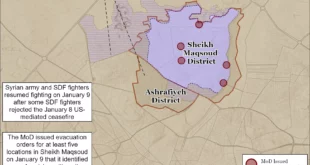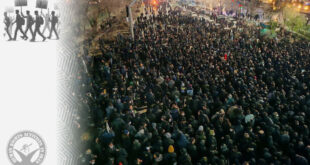 BAGHDAD (AFP) — Iraq’s first post-Saddam Hussein draft constitution was presented to parliament Monday under intense US pressure, just minutes before a new deadline ran out, but with a number of issues still unresolved.
BAGHDAD (AFP) — Iraq’s first post-Saddam Hussein draft constitution was presented to parliament Monday under intense US pressure, just minutes before a new deadline ran out, but with a number of issues still unresolved.
Parliament Speaker Hajim Hasani said MPs received the draft constitution on time Monday, after tortuous negotiations, but that it was incomplete and could still be modified.
“Few issues remain to be settled and will be dealt with within three days,” Hasani said, addressing MPs.
“There is a determination to reach an agreement on all points… All parties will work within the next three days to reach an agreement. We will meet in three days to finalise this issue.”
After a parliament session which lasted barely 10 minutes around the midnight deadline, Hasani told reporters there were three issues that still needed to be sorted out.
“These points include federalism, and the way to form these [federal] regions … the terminology used [in the de-Bathification process], whether to use the term Baath Party or Saddam’s Baath …, the other issue is structuring of authority between the presidency, parliament and the government.”
President Jalal Talabani said the three outstanding issues including the treatment of figures associated with the former regime would be discussed by MPs, though he did not elaborate.
“The big majority of it has been agreed but three articles remain,” Talabani told AFP. “Now we will give a chance to members of the national assembly to look at it and I hope within three days these problems will be solved.”
Earlier Monday Shiite negotiator, Jawad Maliki, said that Shiite and Kurdish groups had finally agreed upon the draft after weeks of wrangling and would present it to parliament regardless of the minority Sunni Arabs.
Negotiations on the charter, a key stage in Iraq’s political transition following the toppling of Saddam in April 2003, have been dogged by differences over the role of Islam, federalism and the sharing of oil-wealth.
The United States had been pressuring Iraqis to agree on the charter after missing a previous August 15 deadline, hoping that its approval will help stem the raging insurgency and pave the way for a withdrawal of foreign troops.
“The establishment of a democratic constitution will be a landmark event in the history of Iraq and the history of the Middle East,” US President George W. Bush said in a speech to 15,000 war veterans on Monday.
“All of Iraq’s main ethnic and religious groups are working together on this vital project.
Sunni Arabs, however, expressed discontent over the draft negotiations.
Sunni panellist Saleh Motlag told CNN: “If the document does not have consensus it is illegal.
“The document does not have a Sunni voice in it … it does not have the voice of Iraq. The document will be defeated in the referendum not just in the three Sunni provinces but all across Iraq.”
The Sunnis are a majority in Anbar, Nineveh and Salaheddin provinces and Iraq’s interim law stipulates that the draft fails if two-thirds of any three provinces vote against it during the planned referendum.
Zalmay Khalilzad, US ambassador, sought to pacify the Sunnis after the draft presentation.
“We will work together with the members of the commission to broaden the support from the Sunni participants in the constitution process,” Khalilzad told CNN.
“It is absolutely vital for the stability of Iraq and for winning the war against insurgents that Sunnis see themselves in this new picture of new Iraq that is emerging.”
Sunnis oppose a federal structure, fearing that it could rob them of a fair share in Iraq’s lucrative oil reserves which are mainly concentrated in the Kurdish north and Shiite south.
“Sunnis have concerns about a few issues, one of which is the modality of federalism. They have dropped their opposition to the principle of federalism,” Planning Minister Barham Saleh told AFP minutes before the draft was submitted in parliament.
Kurdish negotiators have in recent days faced pressure from US officials to give up demands for self-determination, oil ownership and insistence on a secular constitution in a bid to reach agreement with the Shiites.
Their ambitions to have the oil centre of Kirkuk included within their territory and to seek a degree of control over the region’s oil reserves might have proven more difficult to assuage.
Installing Islam as the country’s main source of legislation and allowing clerics a political role, as demanded by the conservative Shiite bloc, have also been opposed by the Kurdish bloc.
US officials dropped their own opposition to satisfy the Shiites, but the secular Kurds opposed the move, arguing that it contravened women’s rights and Iraq’s secularist traditions.
Rebels killed 28 people in separate attacks Wednesday, including eight policemen who died north of Baghdad when their bus was riddled with bullets by masked gunmen.
Crude oil exports from Iraq’s southern oilfields resumed after suspension from midnight Sunday due to a power failure at a pumping stations.
 Eurasia Press & News
Eurasia Press & News


